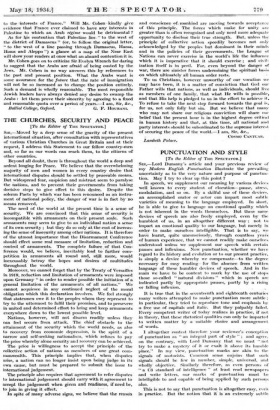THE CHURCHES, SECURITY AND PEACE
[To the Editor of THE SPECTATOR.]
SIR,—Moved by a deep sense of the gravity of the present international situation, after consultation with representatives of various Christian Churches in Great Britain and at- their request, I address this Statement to our fellow country-then and, so far as our words can reach them, to the citizens of other countries.
Beyond all doubt, there is throughout the world a deep and ardent longing for Peace. We believe that the overwhelming majority of men and women in every country desire that international disputes should be settled by peaceable means. But widespread fear, suspicion and mistrust seem to paralyse the nations, and to preVent their goveinments from -taking decisive steps to give effect to this desire. Despite the solemn Pacts by which war has been renounced as an instru- ment of national policy, the danger of war is in fact by no means removed.
The need of the world at the _present time is a sense of security. We are convinced that this sense of security is incompatible with armaments on their present scale. Such armaments may seem to give to an individual nation a sense of its own security ; but they do so only at the cost of increas- ing the sense of insecurity among other nations. It is therefore of the utmost importance that the -Disarmament Conference should effect some real measure of limitation, ieduction and contrOl of armaments. The complete failure ..of that Con- ference would, we believe, inevitably lead to further com- petition in . armaments all round and, still more, would inexcusably betray the hopes and desires of multitudes throughout the world.
Moreover, we cannot forget that by the Treaty of Versailles in 1919, reduction and limitation of armaments were imposed upon Germany " in order to render 'possible the initiation of a general limitation of the armaments of all nations." We cannot acquiesce in any continued neglect of the moral obligation which this declaration involves. We feel strongly that statesmen owe it to the peoples whom they represent to try to the uttermost to fulfil their proniises, and to persevere in united and determined effort to bring and keep armaments everywhere down to the lowest possible level.
Nations, however, will not disarm readily unless they can feel secure from attack. The chief obstacle to the attainment of the security which the world needs, as also to recovery from economic depression, is the spirit of a narrow and self-seeking nationalism, which refuses to pay the price whereby alone security and recovery can be achieved.
The price is willingness to accept the principle of the collective action of nations as members of one great com- monwealth. This principle implies that, when disputes arise, a nation can no longer insist upon being judge in its own cause, but must be prepared to submit the issue to international judgement.
The principle also requires that agreement to refer disputes to international judgement should carry with it agreement to accept the judgement when given and readiness, if need be, to join in giving .it effect. '
In spite of many adverse signs, we believe that, the reason and conscience of,menkind are moving towards acceptance of this principle. The forces which make for unity are greater than is often recognized and only need more adequate opportunity 'to diselose their true strength. But, unless the principle of collective action speedily ' becomes not only acknowledged by the peoples but dominant in their minds and in the policies of their governments, the League of Nations can never exercise in the world's life the influence which it is imperative' that it should exercise ; and civil- ization itself is in peril. For, even beyond the danger of war, there are sinister forces undermining the spiritual basis
on which ultimately all human order rests. _
To- us Christians, however unworthy of our vocation we may have been, it is a matter of conviction that God our Father wills that nations, as well as individuals, should live as members of one family, that what He wills is possible, and that His help is pledged to us in- the effort to achieve it. To refuse to take the next step forward towards the goal is, for us, not only folly but sin. But we believe that many who may not share our religious conviction will share our belief that the present hour is in the highest degree critical in human history and that, at this time, all national and party interests should be subordinated to the supreme interest of securing the peace of the world.—I am, Sir, &c.,








































 Previous page
Previous page